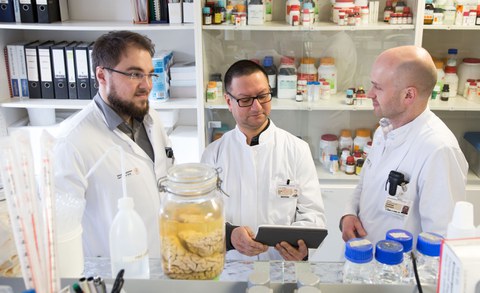Jan 23, 2018
ALS: Dresden-based basic researchers discover new disease mechanism for amyotrophic lateral sclerosis

Marcel Naumann, Dr. Arun Pal and Prof. Dr. Dr. Andreas Hermann
The Dresden research team led by Prof. Dr. Dr. Andreas Hermann from the Department of Neurology at the University Hospital Carl Gustav Carus has discovered a new disease mechanism of Amyotrophic Laterals Sclerosis (ALS) in basic scientific work on patient-derived human nerve cells. Up to now, the pathological deposition of misfolded proteins (proteins) has often been regarded as an essential disease-causing mechanism of this disease. The working group now shows that malfunctions of the cellular repair system for damage to the cell's genetic material (DNA) could be observed and causally linked before the protein deposits and neurodegeneration. This opens up completely new research and treatment perspectives for ALS. The scientists have now published their findings in the journal Nature Communications (DOI: 10.1038/s41467-017-02299-1) in a study carried out with numerous other national cooperation partners - in particular the University Hospitals of Ulm and Aachen. Possible therapeutics for these observed malfunctions of the cellular repair system are already being tested in Phase 1 studies in tumor diseases, where they have been known as the cause for a long time. The research project was funded by the virtual Helmholtz-Institute "RNA dysmetabolism in ALS and FTD (VH-VI-510)", the Else-Kröner-Promotions-Kolleg Dresden, the German Center for Neurodegenerative Diseases (DZNE), the DFG-Center for Regenerative Therapies Dresden (CRTD), the German Society for Muscle Diseases, the Roland Ernst Foundation Saxony and the NOMIS Foundation as well as by the German Society for Muscle Diseases.
